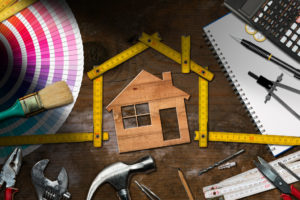- Install and maintain functioning smoke alarms on every level of your home.
- Secure your home with sturdy locks, including deadbolts and window locks.
- Practice fire safety measures such as creating an escape plan and having fire extinguishers on hand.
- Childproof your home by installing safety gates, securing furniture, covering electrical outlets, and storing hazardous materials properly.
- Maintain safe walkways by repairing any damaged or uneven pavers.
Ensuring the safety of your family at home is a top priority for every homeowner. By taking proactive measures and implementing safety protocols, you can create a secure environment where your loved ones can thrive. This guide will discuss five tips to help you ensure safety for your family at home.
1. Install and Maintain Smoke Alarms
Smoke alarms are crucial for early detection of fires and can save lives. To maximize safety, it is essential to have smoke alarms installed on every floor of your home, including inside bedrooms and outside sleeping areas. This ensures comprehensive protection and peace of mind for you and your loved ones. Regularly test the alarms to ensure they are functioning correctly, and replace batteries at least once a year.
Consider upgrading to interconnected smoke alarms, which will trigger all the alarms in your home if one detects smoke. This provides an additional layer of protection, especially when family members are spread across different areas of the house.
2. Secure Your Home with Adequate Locks

Properly securing your home is essential to protect your family from intruders. Install sturdy deadbolt locks on all exterior doors, including the door connecting your garage to your home. Reinforce windows with window locks or security film to deter potential burglars.
Consider installing a home security system that includes motion sensors, door/window sensors, and surveillance cameras. Display signs indicating that your home is protected by a security system — this alone can act as a deterrent.
3. Practice Fire Safety Measures
In addition to having smoke alarms, it’s important to practice fire safety measures at home. Create a fire escape plan that outlines multiple exit routes from each room and establish a designated meeting point outside. Regularly review and practice the escape plan with your family.
Ensure the safety of your home by strategically placing fire extinguishers in critical areas like the kitchen and garage. It is vital to educate everyone on their operation and usage. Keep flammable materials away from heat sources, and never leave cooking appliances unattended.
4. Childproof Your Home
If you have young children, childproofing your home is crucial to prevent accidents and injuries.
Here are some tips on how to childproof your home:
Install Safety Gates

Safety gates are essential for homes with young children. Install safety gates at the top and bottom of staircases to prevent falls and other accidents. Make sure that the gate is securely mounted in place, as toddlers can easily push them over if not properly secured. Also, make sure to check the gate frequently to ensure that it is still secure.
Secure Furniture
Heavy furniture can easily tip over, so it’s important to keep it away from young children and secure it in place. To ensure the safety of your child, it is important to securely anchor dressers, bookshelves, and other furniture items to the wall. This can be done using L-brackets or straps, which will prevent them from tipping over and causing potential harm. It is important to consistently verify that these brackets or straps remain firmly secured in their designated positions.
Cover Electrical Outlets
Children can easily stick their fingers into electrical outlets, so it’s important to cover them with childproof plugs. You should check all of the outlets in your home and make sure that they are covered correctly. It’s also a good idea to teach your children about the dangers of electrical outlets and remind them not to touch them.
Store Hazardous Materials
Keep hazardous materials, such as cleaning products and medications, in locked cabinets that are out of reach of children. Make sure that the locks are secure and cannot be easily opened by young kids. Don’t forget to keep small objects away from your children, as they can be choking hazards. You should also keep an eye out for any items that may be left lying around the house, as these can be dangerous for kids.
5. Maintain Safe Walkways
Maintaining safe walkways around your home is essential to prevent trips and falls. Uneven or damaged pavers can pose a safety risk, especially for older family members or those with mobility challenges.
Consider hiring a professional paver sealing company to assess and repair any damaged or uneven pavers. They can ensure that your walkways are level, free of cracks, and slip-resistant. By maintaining safe walkways, you create a safer environment for your family and reduce the risk of accidents.
In Summary
Ensuring the safety of your family at home requires proactive measures and attention to detail. Install and maintain smoke alarms, secure your home with adequate locks, practice fire safety measures, childproof your home, and maintain safe walkways with professional paver repair. By implementing these tips, you can create a secure and welcoming home environment where your family can thrive.



















